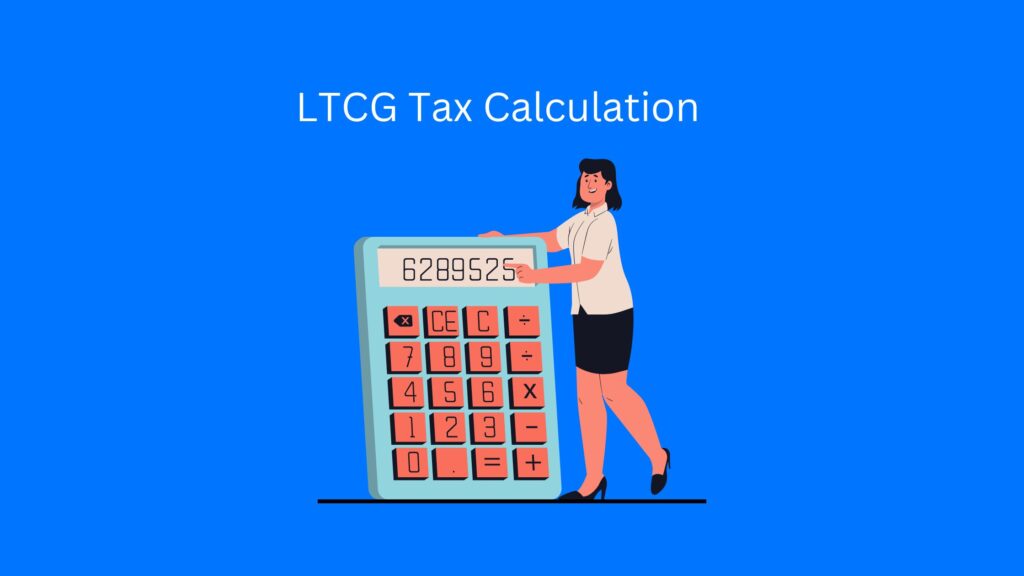
Hey property investors! Planning to sell your apartment or plot? Before you pop the champagne, let’s discuss the Long-Term Capital Gains (LTCG) tax on Property.
This article is your go-to guide for understanding LTCG on property for Indian Investors . We’ll explain what it means, how to calculate it, and tricks to save on taxes.
Long-Term Capital Gains (LTCG) Tax on Property in India
Imagine you bought some land a while back, and now, with real estate prices shooting up, you’re looking to sell it for a big profit. That profit you’re making is called a capital gain. If you’ve owned the land for more than two years, it’s called a Long-Term Capital Gain (LTCG).
Now, when you’re about to pocket that profit, the government steps in and says, “Hold on, we want a piece of that too!” That’s where LTCG tax kicks in.

Tax Concept of LTCG on Property for Indian Investors
The Indian government started taxing Long-Term Capital Gains (LTCG) on property in 2017. If you sell your property after holding it for more than 2 years (or 3 years if it was inherited), any profit you make gets taxed as LTCG. Currently, the LTCG tax rate on property in India (as of April 2024) is 20%, but there’s a perk called indexation.
Let’s say you bought your property for ₹10 lakh in 2010. By 2024, due to inflation, the real value of that ₹10 lakh might be lower. Indexation adjusts the purchase price for inflation, which can reduce your taxable profit and possibly lower your tax bill.

Breaking Down LTCG Tax Calculation for Property Sales
To calculate LTCG tax on property sales, you subtract the indexed cost of acquisition from the sale price and then multiply the result by 20%.
The sale price is the amount you receive when you sell your property, while the indexed cost of acquisition is the purchase price adjusted for inflation using the Wholesale Price Index (WPI).
For example, let’s say you bought a property in 2015 for ₹50 lakh and sold it this year for ₹1 crore. Assuming the WPI adjustment increases the cost of acquisition to ₹70 lakh, the calculation would be:
LTCG Tax = (₹1 crore – ₹70 lakh) * 20%
= ₹30 lakh * 20%
= ₹6 lakh
So, in this case, the LTCG tax would be ₹6 lakh.

Saving on Property Tax: LTCG Exemptions & Deductions
When you sell a property and earn a profit, referred to as Long-Term Capital Gain (LTCG), you have the opportunity to sidestep tax obligations by reinvesting that profit into specific assets within a defined timeframe. These assets may include a new residential property, affordable housing, or capital gains bonds.
Governed by Section 54 of the Indian Income Tax Act, this provision allows you to completely avoid paying LTCG tax if you reinvest the proceeds from selling your property into a new residential property within India within a specified period, typically 18 months before or 2 years after the sale.
This incentivizes individuals to channel their gains back into the real estate market, fostering growth and development in the sector.
Moreover, if your total LTCG from all sources, including property sales, in a financial year amounts to less than ₹2 lakh, you are exempt from paying any tax on those gains.
If you don’t want to buy another property after selling one, there’s still a way to avoid paying taxes on the profit you made. It’s called Capital Gains Reinvestment in Bonds, under Section 54EC.
You can invest the money you made from selling your property into specific government bonds within six months of the sale, and you won’t have to pay taxes on the profit. However, any interest you earn from these bonds will be taxed.
Selling a property often involves expenses like agent fees and legal fees, which can eat into your profits. But the good news is you can subtract these costs from your profit, reducing the amount of tax you owe.
Lastly, there’s something called Cost Inflation, which recognizes that the value of money goes down over time due to inflation.
Reducing Taxes When Selling Your Property
To minimize taxes when selling property, consider these effective strategies. Firstly, extending the duration of property ownership can be advantageous. The longer you hold onto your property, the more you can benefit from indexation, which adjusts the purchase price for inflation, potentially lowering your taxable gain.
Aiming for a holding period of at least 2 years, or 3 years if the property was inherited is advisable, as this qualifies you for lower long-term capital gains tax rates.
Another strategy involves reinvesting the proceeds from the property sale into a new residential property within India, utilizing the LTCG reinvestment option. Doing so within a specific timeframe can grant you complete exemption from LTCG tax.
However, it’s crucial to carefully assess conditions such as the minimum investment amount and location requirements before proceeding with this option. This approach not only helps in growing your real estate portfolio but also minimizes your tax liability.
PropGrow Technology Pvt. Ltd., a leading real estate consultant in Guragon, recognizes the paramount importance of understanding Long-Term Capital Gains (LTCG) tax implications for property investors in India.
They stress the necessity of informed decision-making and strategic planning to mitigate tax burdens and optimize returns. PropGrow advises investors to leverage tools such as indexation and reinvestment options to minimize tax liabilities effectively.
By providing comprehensive guidance on LTCG tax and tax-saving strategies, PropGrow aims to empower investors to make informed decisions and navigate the complexities of the real estate market with confidence and efficiency.
Conclusion
Understanding the intricacies of LTCG on Property for Indian Investorsis crucial for investors. By leveraging strategies such as indexation, reinvestment options, and deductions, investors can minimize tax liabilities and optimize returns.
With careful planning and informed decision-making, navigating LTCG tax becomes more manageable, ensuring that investors align their financial goals with tax-efficient strategies.
What is Long-Term Capital Gains (LTCG) tax on property in India?
Long-Term Capital Gains (LTCG) tax is applicable when you sell a property that you have owned for more than two years (or three years if inherited). The profit you make from this sale is taxed as LTCG. As of April 2024, the LTCG tax rate on property in India is 20%.
How is LTCG on property calculated?
To calculate LTCG tax on property sales, subtract the indexed cost of acquisition (adjusted purchase price for inflation) from the sale price and then multiply the resulting gain by the LTCG tax rate (currently 20%).
Are there ways to save on LTCG tax when selling property?
Yes, there are strategies to minimize LTCG tax. You can reinvest the proceeds from property sale into specific assets like a new residential property or capital gains bonds within a specified timeframe to avail exemptions. Additionally, expenses related to property sale (like agent fees) can be deducted from the profit, reducing taxable gain.
What are LTCG exemptions available to property investors in India?
Section 54 of the Income Tax Act provides exemptions if LTCG from property sale is reinvested into a new residential property within a certain period. This exemption can help investors defer or completely avoid paying LTCG tax.
Is indexation applicable for calculating LTCG tax on property?
Yes, indexation adjusts the purchase price of the property for inflation using the Wholesale Price Index (WPI). This reduces the taxable gain by accounting for the decrease in the real value of money over time.
To Read more about Real Estate investment opportunities for NRI





